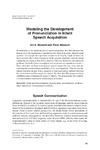Modeling the development of pronunciation in infant speech acquisition.
Date
2011-01-01Author
Subject
Metadata
Show full item recordAbstract
Pronunciation is an important part of speech acquisition, but little attention has been given to the mechanism or mechanisms by which it develops. Speech sound qualities, for example, have just been assumed to develop by simple imitation. In most accounts this is then assumed to be by acoustic matching, with the infant comparing his output to that of his caregiver. There are theoretical and empirical problems with both of these assumptions, and we present a computational model- Elija-that does not learn to pronounce speech sounds this way. Elija starts by exploring the sound making capabilities of his vocal apparatus. Then he uses the natural responses he gets from a caregiver to learn equivalence relations between his vocal actions and his caregiver's speech. We show that Elija progresses from a babbling stage to learning the names of objects. This demonstrates the viability of a non-imitative mechanism in learning to pronounce.
Collections
Publisher
Place of Publication
Journal
Volume
Issue
Pagination
Author URL
Recommended, similar items
The following license files are associated with this item:


